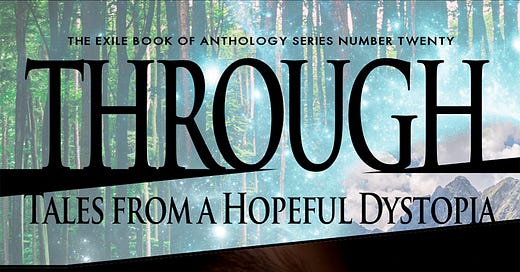Mermaids, arborists, and pollinators are among the characters to be found in Through the Portal: Tales from a Hopeful Dystopia. Edited by Lynn Hutchinson Lee and Nina Munteanu, this eco-fiction collection gathers over thirty stories that fall under the general umbrella of hopeful dystopias.
“While some dystopian fiction can be despairing, the works in Through the Portal try to offer a note of optimism, however small.”
While some dystopian fiction can be despairing, the works in Through the Portal try to offer a note of optimism, however small. Fans of Canadian speculative fiction may be familiar with some of the authors, including Holly Schofield, Melanie Marttila, Ursula Pflug, and Melissa Yuan-Innes.
The stories (and two poems) in the collection vary in length and tone, with the “hopeful” aspect more prominent in some than others. While each story had its merits, there were some that I found particularly compelling. Among these were Bruce Meyer’s “A Fence Made of Names.” Meyer weaves together a story about a visit to Nantucket, a Quaker graveyard, and memories about whale encounters to powerful effect.
“Apple Bread” by Katherine Koller is a quiet tale about a woman named Esther tending to the trees in her back yard. Told from the viewpoint of Apple, the story portrays the way trees send nutrients and signals about health status to one another. After reading “Apple Bread,” I looked at the redbuds, spruces, catalpas, and other leafy inhabitants of my own back yard with a new appreciation.
“After the Fall: Lela’s Story,” by Zilla Jones, satirically re-imagines Adam and Eve and the Garden of Eden in a way that I found both humorous and thought-provoking. Meanwhile, in “Rented,” Agata Antonow jumps ahead to the perhaps not-so-far future when wrist implants register, regulate, and track our interactions, both personal and commercial. Everything from accepting temporary jobs to renting out rooms to liaisons with strangers go through the implant. This story felt chillingly plausible both in concept, and in the intrusiveness of the AI interface.
Some authors imagine bodily modifications that might be required to exist and thrive in a post-climate-change world. And yet, even in these stories when the very nature of being human has changed, qualities like our capacity for love, loyalty, and joy persist.
Pollinators play a central role in three of the stories, underscoring their ecological and agricultural importance. Many of the stories explore the power of connection, and the potential ways we might heal the land and ourselves.
Some of the tales have a magical bent. In “The Shift,” Isabella Mori recounts a story about wolves, and the steps the leader of a lupine community takes to increase the odds of survival for the species. In Nina Munteanu’s Afterword, titled “The Water Sprite,” a glimpse of sprites in an old-growth forest reminds us of the sense of magic and mystery that natural settings provide. When we allow those settings to be paved over or compromised by development, the story suggests, some magic will leach out of our own lives.
Through the Portal offers intriguing and imaginative glimpses into the future. As “A Fence Made of Names” suggests, we often don’t appreciate what we have until we lose it. By showing us what we stand to lose, these stories offer a reason to increase our actions to preserve the planet.
There was a lot to like about this collection. My only complaints, such as they were, were that some of the endings were more ambiguous than I prefer. In addition, I found the ending of one particular story disturbing, although other readers’ mileage may vary.
While many of the tales hint at dark times ahead, it was refreshing to find so many that offered a ray of hope despite that. Whether it’s finding the will to live another day, returning to a better relationship with the land and the Earth, or taking steps to improve the world in even a small way, these stories affirm humanity’s potential for resilience in challenging times.
Will ingenuity, love, and respect for the earth help us work through whatever changes might lie ahead? Through the Portal offers hope that these qualities, if not enough in and of themselves, will help us find our way.
About the Editors
Nina Munteanu is a Canadian ecologist and novelist of science fiction and fantasy. In addition to eight published novels, Munteanu has written short stories, articles, and non-fiction books, which have been translated into several languages throughout the world. Munteanu is a member of SF Canada. She writes articles on the environment and sustainability.
Lynn Hutchinson Lee is a multidisciplinary artist/writer, and a member of two artists’ collectives: Red Tree (Hamilton and Toronto, Ontario) and chirikli (Toronto and Sarajevo, Bosnia/Herzegovina). She was first place winner of the 2022 Joy Kogawa Award for Fiction, and her writing has appeared in Room (Canada); Wagtail: the Roma Women’ s Poetry Anthology (Butcher’ s Dog, U.K.); Food of My People and Cli-Fi: Canadian Tales of Climate (both from Exile Editions, Canada), and elsewhere.
Book Details
Publisher : Exile Editions (Dec 31 2024)
Language : English
Paperback : 360 pages
ISBN-10 : 1990773346
ISBN-13 : 978-1990773341






Thank you! I enjoyed the collection, and maybe now even more than ever we need stories of this sort.
Great review as always, Lisa!